Submitted by NOCTI, 2021 Fall Meeting Sponsor
 It has been said that: 1) innovation survives when people believe in ideas; 2) an idea that survives is one that creatively solves a problem; and 3) a great idea is one that survives over time. By these metrics Career Technical Education (CTE) is clearly a great idea, evidenced by the federal funding that supports it, allowing states to establish their own CTE delivery system that leads to learner success in a career of their choice. This has resulted in 50+ versions of what a high-quality CTE program looks like.
It has been said that: 1) innovation survives when people believe in ideas; 2) an idea that survives is one that creatively solves a problem; and 3) a great idea is one that survives over time. By these metrics Career Technical Education (CTE) is clearly a great idea, evidenced by the federal funding that supports it, allowing states to establish their own CTE delivery system that leads to learner success in a career of their choice. This has resulted in 50+ versions of what a high-quality CTE program looks like.
The real strength of any CTE program is based on a curriculum developed with quality in mind, advised by industry expertise, and delivered in a real-world environment by a teacher with an occupational skill set and significant work experience. Innovative states maintain programs to assist in the consistent challenge CTE educators face of transitioning from the workplace to the classroom. In some states, individuals are given a certification or a license to teach in public schools. However, high-quality programs aren’t just about certifications; they must also establish a pathway to continued instructional improvement and support career growth and success.
NOCTI has been involved in helping to establish a systematized approach to quality CTE teacher preparation since the 1960s, and decisions in the instructional improvement process rely on objective data. However, only recently has NOCTI focused on the quality of the major components of a CTE system.
Through a collaboration of numerous organizations and states, NOCTI is excited to announce its upcoming launch of two levels of national certification for CTE teachers, CTE administrators and professionals managing CTE data. Each of these certifications focus on assuring a uniform, high-quality CTE system.
- The certifications for CTE teachers address the nuances in CTE teaching pedagogy, performance lesson planning, Career Technical Student Organizations (CTSOs) and industry advisors.
- The certifications for CTE administrators include working with multiple districts, implementing budgets and planning for the future.
- The certifications for data professionals cover data sources, data statistics and data security.
NOCTI’s education professional credentials can be used as part of the hiring process, a component of a state licensing system or as a guide for individualized or group professional development. For more information visit www.nocti.org.


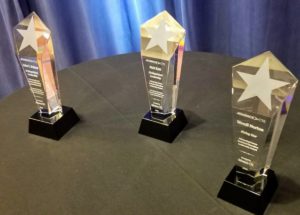 At the Advance CTE Fall Meeting, we were thrilled to honor three Career Technical Education (CTE) leaders through our new State CTE Leadership awards. Wendi Morton, CTE Coordinator of Federal and State Programs at the Utah State Board of Education, received the Rising Star award. Richard Katt, the former State CTE Director at the Nebraska Department of Education, and John T. Pulver, Associate Director of the Pennsylvania Association of Career & Technical Administrators (PACTA), each received the Distinguished Leadership award.
At the Advance CTE Fall Meeting, we were thrilled to honor three Career Technical Education (CTE) leaders through our new State CTE Leadership awards. Wendi Morton, CTE Coordinator of Federal and State Programs at the Utah State Board of Education, received the Rising Star award. Richard Katt, the former State CTE Director at the Nebraska Department of Education, and John T. Pulver, Associate Director of the Pennsylvania Association of Career & Technical Administrators (PACTA), each received the Distinguished Leadership award.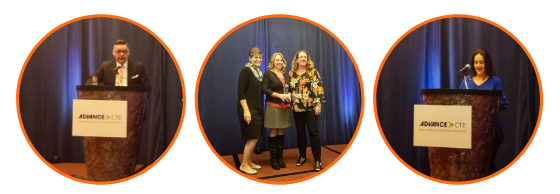
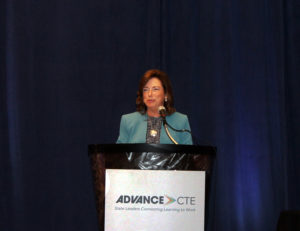 and leading more than 50,000 employees. Humpton began her remarks by emphasizing the importance Siemens places on investing in their employees. Th
and leading more than 50,000 employees. Humpton began her remarks by emphasizing the importance Siemens places on investing in their employees. Th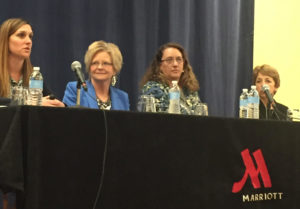 Partnerships and Collaboration” on how state leaders in Career Technical Education (CTE) can build meaningful relationships. Kate Kreamer, Deputy Executive Director of Advance CTE, moderated this session, and encouraged the room to be intentional when building partnerships and evaluate not just the strength of the relationship but also the value.
Partnerships and Collaboration” on how state leaders in Career Technical Education (CTE) can build meaningful relationships. Kate Kreamer, Deputy Executive Director of Advance CTE, moderated this session, and encouraged the room to be intentional when building partnerships and evaluate not just the strength of the relationship but also the value. 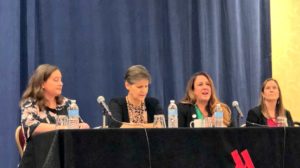 capacity, funding and policy from making any real progress on either front, leaving these two
capacity, funding and policy from making any real progress on either front, leaving these two  According to recent social media trends, modern Americans, especially Millennials, would happily trade traditional gift-giving for the gift of travel or experience in relation to how they most want to enjoy a contribution toward life.
According to recent social media trends, modern Americans, especially Millennials, would happily trade traditional gift-giving for the gift of travel or experience in relation to how they most want to enjoy a contribution toward life. YouScience is a revolutionary career guidance platform that is poised to change the way learners explore Career Technical Education (CTE) programs of study and plan for their futures.
YouScience is a revolutionary career guidance platform that is poised to change the way learners explore Career Technical Education (CTE) programs of study and plan for their futures. 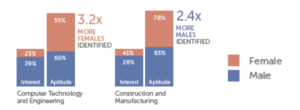 States that are becoming aware of this “exposure bias” limitation are shifting their focus and are having great success. Georgia, for example, is using its
States that are becoming aware of this “exposure bias” limitation are shifting their focus and are having great success. Georgia, for example, is using its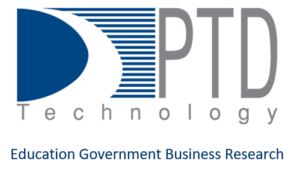

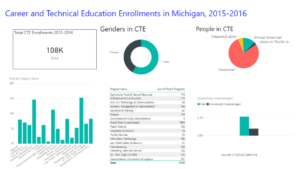
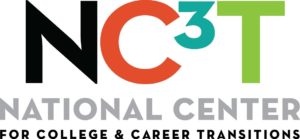 The most common image when talking about workforce development is that of a “leaky pipeline;” where we lose people at every key transition point along the way to the labor pool. In high school, we lose learners who drop out before graduation. Among those who do graduate, we lose the ones who don’t go on to some form of postsecondary education. Among those who do pursue postsecondary credentials, we have another round of dropouts who leave before earning a degree or certification. As a result, the final pool of qualified workers is much smaller than the pool we started out with.
The most common image when talking about workforce development is that of a “leaky pipeline;” where we lose people at every key transition point along the way to the labor pool. In high school, we lose learners who drop out before graduation. Among those who do graduate, we lose the ones who don’t go on to some form of postsecondary education. Among those who do pursue postsecondary credentials, we have another round of dropouts who leave before earning a degree or certification. As a result, the final pool of qualified workers is much smaller than the pool we started out with. Every year thousands of technology positions go unfilled. Schools all over the country are working to help learners prepare to fill those roles. Take cybersecurity, for instance. The
Every year thousands of technology positions go unfilled. Schools all over the country are working to help learners prepare to fill those roles. Take cybersecurity, for instance. The 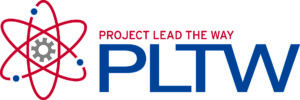 If learners don’t know what’s possible, they can’t explore opportunities available to them and pursue paths that position them to thrive.
If learners don’t know what’s possible, they can’t explore opportunities available to them and pursue paths that position them to thrive.